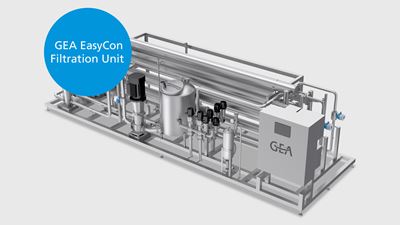Compact Membrane Filtration Systems
GEA EasyCon Filtration Unit
Designed to concentrate solids by nanofiltration (NF) or reverse osmosis (RO) membrane filtration technology, the compact and standardized “plug and play” EasyCon is available for small-to-medium feed rates and can concentrate a feedstock to provide a solution with a total solids (TS) content of up to 25%.
Cost-effective EasyCon
When cost is key and improved return on investment (ROI) is of great importance, the EasyCon Filtration Unit is the right choice for concentrating solids.
GEA cross-flow filtration technology with nanofiltration or reverse osmosis spiral-wound membranes can be used to concentrate the solids content of various feedstocks.
For concentration applications, reverse osmosis membranes should be used. If a partial demineralisation is required, nanofiltration membranes are recommended. Operating at temperatures of approximately 10–15 °C, the filtration unit eliminates the risk of thermally stressing the product.
EasyCon - easy to install and operate
Frame-mounted and ready for installation, the EasyCon unit includes filtration modules with nanofiltration or reverse osmosis membranes, pumps, instruments, a clean-in-place (CIP) dosing unit and control technology for automatic and easy operation.
Operating parameters and performance data of the EasyCon
- Processing feedstocks with a TS of 5–12%, a maximum concentration of up to 25% can be achieved
- With a volumetric concentration factor (VCF) of 4.0, 1,500 l/h of water can be removed from an infeed of 2,000 l/h
- Capacities from 2,000-32,000 l/h
- Low operating temperature (approx. 10–15 °C)
EasyCon at-a-glance
- Plug & play design for fast installation and commissioning
- Compact system design for small footprint
- No assembly on site as all components are frame-mounted
- Automatic control and visualization with touchscreen for easy operation
- Processing of multiple products possible
- Spiral-wound nanofiltration or reverse osmosis membranes
- Standardized modular design to reduce investment costs and improve the return on investment

Downloads
رؤى GEA
All pharmaceutical freeze-drying vials are the same! Aren't they?
Whether it’s a fad or the future, 100% vial traceability is becoming an increasingly important consideration in the pharmaceutical freeze drying industry. Keeping a close eye on developments is GEA. We’re investigating possible solutions and, what’s more, we have the experience, expertise and know-how to implement them.
البيرة الخالية من الكحول: إنهم يريدون كل شيء - إنهم يريدون أقل
كان هناك وقت حيث من النادر استخدام عبارتي "بيرة خالية من الكحول" و "طعمها جيد" معًا في الجملة نفسها، خاصة من قبل المستهلكين. ولكن قطعت البيرة منخفضة الكحول والبيرة الخالية من الكحول شوطًا طويلًا - وأصبح الكثير منها الآن مشروبات منعشة في حد ذاتها - بفضل جزء صغير من تكنولوجيا GEA.
Innovating patient care with aseptic spray drying
At GEA, our commitment to engineering for a better world fuels our pursuit of innovative solutions that enhance patient care and safety. One of our most promising ventures in recent years is aseptic spray drying – a technology that promises to revolutionize pharmaceutical manufacturing.
